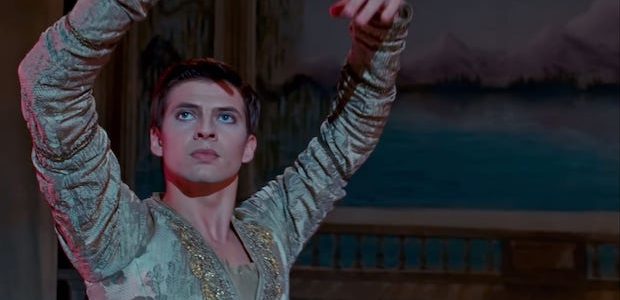
ReelBob: ‘The White Crow’ ★★★
By Bob Bloom
“The White Crow” centers on a pivotal time in the life of acclaimed dancer Rudolf Nureyev — when he decided to defect to the West in 1961.
At the time, Nureyev was a member of the Kirov ballet, which was performing in Paris at the time on the first leg of a tour of Europe.
“The White Crow,” directed by Ralph Fiennes — who also portrays Pushkin, a ballet instructor who had a great impact on Nureyev — focuses more on the drama of the dancer’s life than his performances on stage.
Nureyev was self-conscious about his background. He was born in a Trans-Siberian railroad car; his parents were peasants who lived in a poor, rural area of the Soviet Union.
As the movie demonstrates, Nureyev has ambition and is driven to be an elite dancer. He badgers Soviet cultural authorities when he is dissatisfied with his instructor, thus his transfer to Pushkin’s class.
As portrayed by Oleg Ivenko, a Ukrainian ballet dancer, Nureyev is a complicated blend of arrogance and neediness — he constantly seeks reaffirmation about his talent. He also truly believes he is better than most of the dancers he encounters.
Fiennes’ movie may center on Nureyev, but it also tries to show how a ballet dancer studies to improve. In Nureyev’s case, it is his overwhelming curiosity for knowledge. He spends most of his time in Paris, visiting museums and galleries where he can study paintings and statues to see how artists molded the human form.
Nureyev particularly focused on the positions of hands, arms, feet and legs — their various angles and how they flowed together — and worked hard to incorporate that into his dancing.
Fiennes is candid about Nureyev, showing his shortcomings. He was self-centered, rude and unkind, always putting himself — and his compulsiveness to improve his technique — first.
The Soviet method of teaching stressed structure; executing the same steps in the same manner over and over. Nureyev chafed at the restrictions the Soviet system placed on its performers — be it dance, music, film or theater. Artistic freedom was more than discouraged; it was forbidden.
Fiennes shows the intoxicating fascination Paris had on Nureyev. The verve of the city appealed to him; he wanted to drink it in, explore its every corner.
This, of course, created conflict with the Soviet “chaperones” who always accompanied the talents when they traveled. They opposed their dancers and others meeting or talking with contemporaries from other nations — fearing it would create dissatisfaction — which is exactly what happened in Nureyev’s case.
The movie makes it clear that Nureyev had no interest in politics. He simply wanted the right to express himself in his ballet.
The Soviet officials with the troupe tried veiled threats and intimidation to keep Nureyev in line. But their efforts failed, and when, at the Paris airport, Nureyev was told he was being sent to Moscow, while the rest of the dancers were proceeding to London, he realized his fate — and asked for political asylum.
“The White Crow” is about divided loyalties. Can an artist serve his motherland and remain true to himself? Nureyev realized, under the Soviet system, that was impossible. So, he chose the path most outstanding artists would walk — despite what it cost — the shame and hardships it would bring to his family back home and the disgrace that would be heaped upon him in his homeland.
But Nureyev prevailed. He brought joy to millions and kept faith in himself.
Throughout the movie, we see short sequences of Nureyev on stage, but I wish Fiennes had expanded those scenes. When dancing, Nureyev comes alive and is celestial.
Offstage, however, he is as flawed as the rest of us.
It may be that we want those who touch us to be as perfect in life as when they perform. Fiennes’ noble effort shows that even gifted people who seem to touch heaven when they soar are only mortals when their feet touch the ground.
“The White Crow” is a brief time capsule about an individual’s decision on what steps he chooses to take in life.
I am a founding member of the Indiana Film Journalists Association. My reviews appear at ReelBob (reelbob.com) and Rottentomatoes (www.rottentomatoes.com). I also review Blu-rays and DVDs. I can be reached by email at bobbloomjc@gmail.com or on Twitter @ReelBobBloom. Links to my reviews can be found on Facebook, Twitter and LinkedIn.
THE WHITE CROW
3 stars out of 4
(R), nudity, language, sexual content